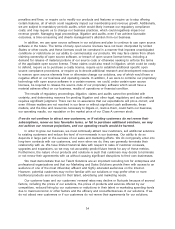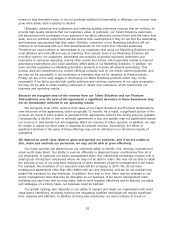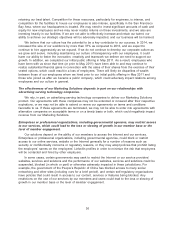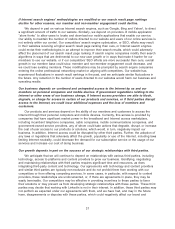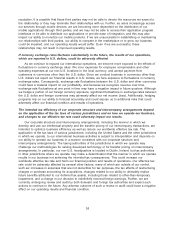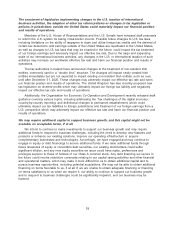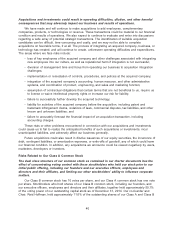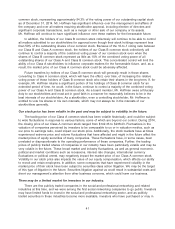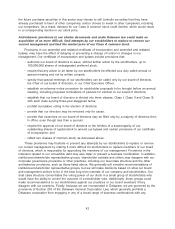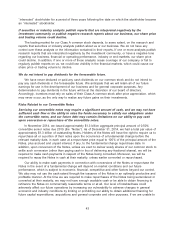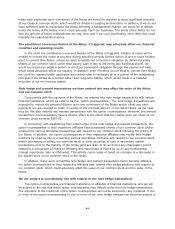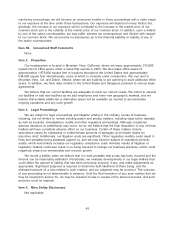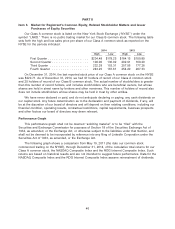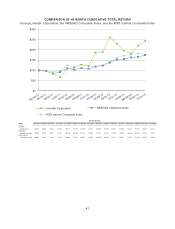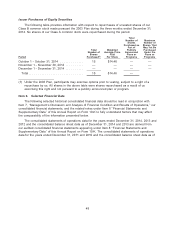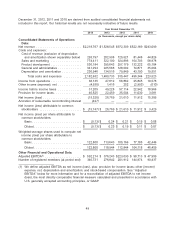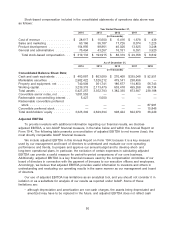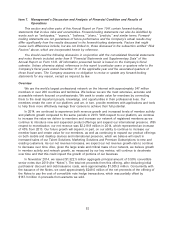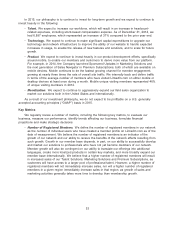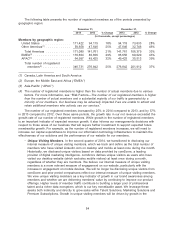LinkedIn 2014 Annual Report Download - page 46
Download and view the complete annual report
Please find page 46 of the 2014 LinkedIn annual report below. You can navigate through the pages in the report by either clicking on the pages listed below, or by using the keyword search tool below to find specific information within the annual report.make cash payments upon conversion of the Notes we would be required to issue significant amounts
of our Class A common stock, which would be dilutive to existing stockholders. In addition, if we do not
have sufficient cash to repurchase the Notes following a fundamental change, we would be in default
under the terms of the Notes, which could seriously harm our business. The terms of the Notes do not
limit the amount of future indebtedness we may incur and if we incur significantly more debt, this could
intensify the risks described above.
The conditional conversion feature of the Notes, if triggered, may adversely affect our financial
condition and operating results.
In the event the conditional conversion feature of the Notes is triggered, holders of notes will be
entitled to convert the notes at any time during specified periods at their option. If one or more holders
elect to convert their Notes, unless we elect to satisfy our conversion obligation by delivering solely
shares of our common stock (other than paying cash in lieu of delivering any fractional share), we
would be required to settle a portion or all of our conversion obligation through the payment of cash,
which could adversely affect our liquidity. In addition, even if holders do not elect to convert their Notes,
we could be required under applicable accounting rules to reclassify all or a portion of the outstanding
principal of the Notes as a current rather than long-term liability, which would result in a material
reduction of our net working capital.
Note hedge and warrant transactions we have entered into may affect the value of the Notes
and our common stock.
Concurrently with the issuance of the Notes, we entered into note hedge transactions with certain
financial institutions, which we refer to as the ‘‘option counterparties.’’ The note hedge transactions are
expected to reduce the potential dilution upon any conversion of the Notes and/or offset any cash
payments we are required to make in excess of the principal amount of converted Notes, as the case
may be. We also entered into warrant transactions with the option counterparties. However, the warrant
transactions could separately have a dilutive effect to the extent that the market price per share of our
common stock exceeds $381.82.
In connection with establishing their initial hedge of the note hedge and warrant transactions, the
option counterparties or their respective affiliates have purchased shares of our common stock and/or
entered into various derivative transactions with respect to our common stock following the pricing of
the Notes. In addition, the option counterparties or their respective affiliates may modify their hedge
positions by entering into or unwinding various derivatives contracts with respect to our common stock
and/or purchasing or selling our common stock or other securities of ours in secondary market
transactions prior to the maturity of the Notes (and are likely to do so during any observation period
related to a conversion of Notes or following any repurchase of Notes by us on any fundamental
change repurchase date or otherwise). This activity could cause or avoid an increase or a decrease in
the market price of our common stock or the Notes.
In addition, if any such convertible note hedge and warrant transactions fail to become effective,
the option counterparties or their respective affiliates may unwind their hedge positions with respect to
our common stock, which could adversely affect the value of our common stock and the value of the
Notes.
We are subject to counterparty risk with respect to the note hedge transactions.
The option counterparties are financial institutions or affiliates of financial institutions, and we will
be subject to the risk that these option counterparties may default under the note hedge transactions.
Our exposure to the credit risk of the option counterparties will not be secured by any collateral. If one
or more of the option counterparties to one or more of our note hedge transactions becomes subject to
44


